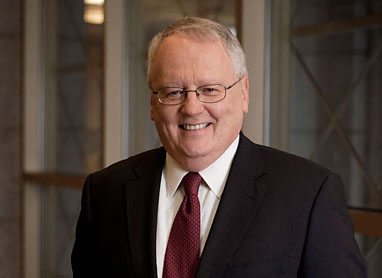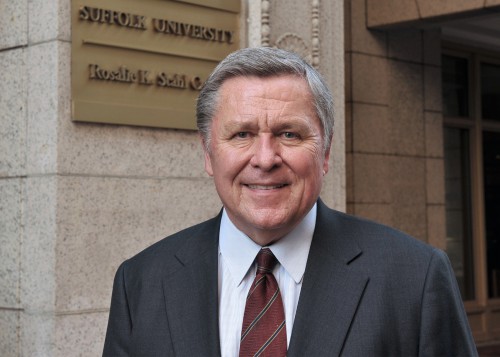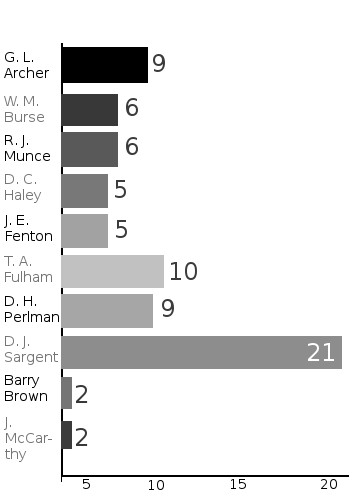Norman Smith stepped into Suffolk’s top position on Sept. 1 after the shocking and unexpected leave of former president James McCarthy.
Smith, who has had a robust career of turning around universities and a resumé filled with experience, said he is here to get Suffolk truly on the map of Boston’s top universities. When asked if he will prefer to be called Dr. Smith or President Smith, he said, “how about just Norman?”
The new president spoke with The Suffolk Journal after just three days in office. The office that once housed a busy president McCarthy had been rearranged. A once spotless desk, adorned with tidy pens and notepads, and a set of plastic, blue Suffolk sunglasses, was now replaced with cluttered papers and copies of “Top Tier,” a memoir written by Smith.
 Though he was still being acclimated with the university, Smith has already made a bold move for Suffolk. He has canceled the fairly new advertising campaign with DeVito/Verdi.
Though he was still being acclimated with the university, Smith has already made a bold move for Suffolk. He has canceled the fairly new advertising campaign with DeVito/Verdi.
“I canceled it. It’s over,” Smith said. “I don’t think it was selling the success of the university. I’m not a fan of promoting yourself at the expense of others.”
The ads appeared on the MBTA, in The Boston Globe, and all over the web. They showcased messages including, “For students who believe college is a privilege, not a birthright,” and “Suffolk students rely on their own will to succeed, not their father’s will.”
Some of the other ads seemed to criticize other universities in Boston.
Suffolk Journal reporters have observed varying opinions on the ads, from seeing them vandalized on the MBTA and reading negative reviews on websites like Reddit.
Smith thinks the ads were “drawing the kind of attention [that] was not necessarily going to generate the results you need. Instead we should be saying this university is great, and here’s how it’s great.”
A new campaign is not in the works yet, Smith said, but he imagined advertisements where a small bullet point could be released every day: when an alumnus got a job, a professor was awarded, or a new building went up.
“That would be a better message to send out,” he said.
Since terminating the ad campaign, Smith’s priority is to get Suffolk high on the radar, a move he believes can be accomplished through raising the university’s ranking on the U.S. News and World Report. Currently, Suffolk stands at 60th.
“Already, I’ve seen enough of Suffolk that I can say there is nothing going on at No. 20 that isn’t going on here,” Smith said. The president plans to reach out to representatives of other colleges who vote in the report to get Suffolk really on the radar.
“Everything else comes your way when you pull that off,” he said
Beyond that goal, Smith has had very little time to examine the university and plan changes.
When asked if he had plans to help the New England School of Art and Design further integrate into the university, Smith raised his hand showing three fingers, and said “I’ve been here three days.”
Will the university pursue a sale of the Ridgeway building? Smith raised three fingers.
Will there be any changes to 20 Somerset? Three fingers.
What about job cuts? Again, three fingers.
Though Smith has not had time to analyze everything, he has looked at Suffolk’s financial standing and believes the school is in a “relatively strong position.”
The operating budget from last year balanced out, rather than landing in deficit, a problem seen at many universities in today’s budget.
“I think Suffolk is experiencing what 95 percent of private colleges in America are experiencing,” Smith said. “Everybody is concerned about the high cost of tuition.”
However, he noted that the university still must cover necessary costs, like utilities and health insurance. Where Smith does plan to save money is in cutting out major programs not being used by students.
“I’ve done no in-depth analysis, but I am going to look critically at things that cannot be sustained because there’s no market for it, there are no students who want to major in it,” Smith said. “You can’t justify spending that money because it’s coming out of the pockets of students. You’ve got to spend the money where it serves the students.”
Smith is not being paid a salary by the university. He is paid through the Registry for College and University Presidents, which he said is “far below anything that was ever paid here in the past.”
“My motives are to do the right thing,” said Smith. He said he was happy to become a part of the university at the beginning of the semester, where he could meet with groups of faculty members and address the new students at convocation.
“I think this school has a great future and I think people should stay,” he said. “The best is yet to come.”





















